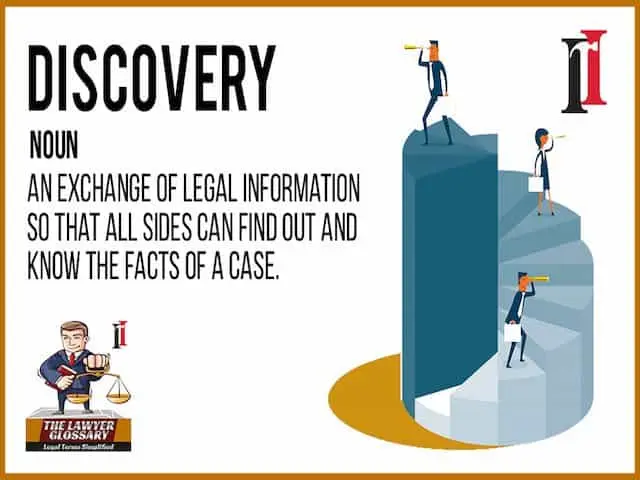What Is Discovery In Law?
The definition of “discovery” in law is the exchange of legal information and known facts of a case. Think of discovery as obtaining and disclosing the evidence and position of each side of a case so that all parties involved can decide what their best options are – move forward toward to trial or negotiate an early settlement.
Parties in a case are required to participate in the discovery process, meaning they must hand over information and evidence about a claim so all participants can know what they are facing at trial.
Listen to a 1-min audio clip with attorney Darryl Isaacs, discussing “discovery”:
 Common types of discovery include:
Common types of discovery include:
WRITTEN DISCOVERY
Under the umbrella of “written discovery” we find:
- Interrogatories – These are written questions, casually referred to as “rogs,” that are presented to the opposing parties and must be answered under oath.
- Requests for Production of Documents (RPD) – This means the other side may ask you to present copies of written documents, emails, photos and similar items that reveal the evidence at play in a case, giving you the opportunity to request the same.
- Requests for Admissions – These seek to get a party in the case to admit some wrongdoing or the accuracy of a particular statement of fact.
ORAL DISCOVERY
Under the umbrella of “oral discovery” we most often find:
- Depositions – These are in-person meetings, often in a conference room, with the parties in the case, the lawyers representing those parties, and a court reporter who will swear in members of the parties and write down everything said under oath at the meeting. Some depositions may be conducted via video or telephone in accordance with state regulations. A deposition is the opportunity for a lawyer to ask anything needed to gather, clarify, and “discover” the evidence and facts involved. Knowing the facts, the parties can then decide what to do with the claim.
INSPECTIONS AND EXAMINATIONS
These can include:
- Inspections of property
- Medical examinations (both mental and physical)
Related Terms:
DISCOVERABLE:
This refers to items of potential evidence – notes, journals, photos, videos, etc – these “discoverable” items must be made available to the opposing parties in litigation.
ANSWER:
When a complaint is presented to a defendant in a lawsuit, the “answer” is the written response that addresses each allegation, admitting or denying fault.
1-minute video defining “discovery”:
What Does Discovery Mean? – Let’s Break It Down In Layman’s Terms:
Trials can be huge consumers of time, energy and finances. Discovery encourages parties to choose settlement, ending the litigation before the trial, or before the end of the trial. Like showing your cards to your opponent in a poker game, discovery reveals the strengths and weaknesses of the hands each party is holding. Now knowing the evidence, each side can then proceed with trial or fold the hand based on what has been revealed.
For these reasons, it’s very rare during a trial for an attorney to present surprise evidence as many lawyer TV characters seem to do with regularity.
You might hear “discovery” used like this, here’s what it means:
“We’re in discovery right now, I hope we’ll get what we need with this deposition.”
Translation:
The investigation process is now underway and we’re looking to get all the evidence we need when we sit down in-person and interview the defendant under oath.
“You’ll need to hand that journal over during discovery if they issue an RPD.”
Translation:
Your private journals may contain evidence in the case, and the opposing parties have a legal right to copy and examine it when they send over a Request for Production of Documents.

 Common types of discovery include:
Common types of discovery include:









